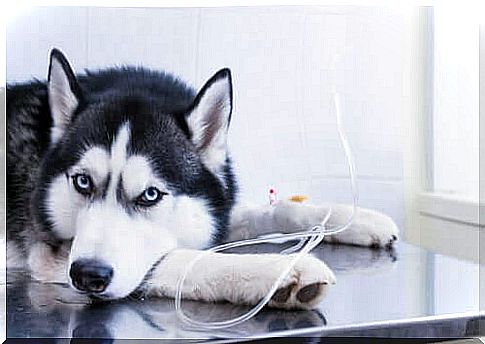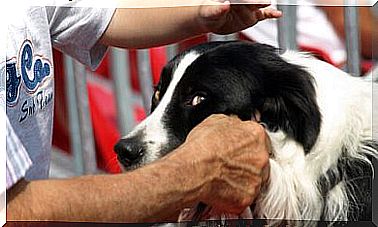Kidney Diseases In Dogs

The kidneys are the organs responsible for filtering the blood and excreting waste through the urine, among other vital functions. Therefore, kidney disease in dogs poses a significant risk to their health. Diet is essential for its prevention.
The kidneys are essential in regulating the body, maintaining body hydration, blood pressure and electrolyte balance. In addition, they secrete hormones that, among other things, stimulate the production of red blood cells.
Kidney failure is one of the most common kidney diseases in dogs and can become chronic. To diagnose this condition, at least one of the kidney functions mentioned above must be compromised.
However, the detection usually occurs when these organs lose about 70% of its functionality, hence the complexity of the treatment.
Causes and symptoms of kidney disease in dogs
According to the International Renal Interest Society (IRIS), a group of veterinarians dedicated to the investigation of renal failure in dogs and cats, the main risk factors are:
- Glomerulonephritis or inflammation of the glomeruli that act as small filters in the kidneys.
- Pyelonephritis or kidney infections.
- Nephrolithiasis or kidney stones.
- Leptospirosis, zoonotic disease caused by the bacterium Leptospira interrogans.
- Cancer.
- Amyloidosis, a disease in which a proteinaceous substance known as ‘amyloid’ accumulates in tissues or organs.
The possibility of developing any of these diseases is greater in older dogs. Therefore, it is important to lead a life of preventive care from the early stages.

The most obvious symptoms of the disease are polyuria and polydipsia, which consist of urinating and drinking more than normal.
Other possible signs are urinary incontinence, lethargy, loss of appetite and weight, bad breath and oral ulcers.
Treatment and importance of nutrition
Treatment for kidney disease in dogs depends on their durability and severity. On the one hand, acute illness can occur as a reaction to accidental ingestion of toxins or rejection of previous drug treatment.
In addition, the ingestion of grapes and raisins causes the appearance of this type of lesion. As the symptoms appear in a timely manner, hospitalization with fluid therapy and renal diet is the most recommended for treatment.
As for chronic disease, it can extend for months, years, or even throughout life in congenital infections. In this case, early detection is essential, for which the owner’s observation and attention must come into play.
Once detected, it is difficult to determine the exact cause responsible for kidney failure, but it will allow the prescription of palliative treatment. Prescription medication, fluid therapy, and a therapeutic renal diet are the cornerstones of fighting the disease.

As far as food is concerned, there are specialized foods, but you can also opt for homemade alternatives. In both cases, the following nutritional aspects must be met:
- Restriction of phosphorus-rich foods to slow the progression of nephropathy.
- Alkaline supplementation to combat frequent metabolic acidosis.
- Moderate protein restriction, with a limit of 40 grams of protein per 1000 kilocalories to reduce the magnitude of uremia.
- High intake of omega 3 fatty acids to help limit the reduction in glomerular filtration.








